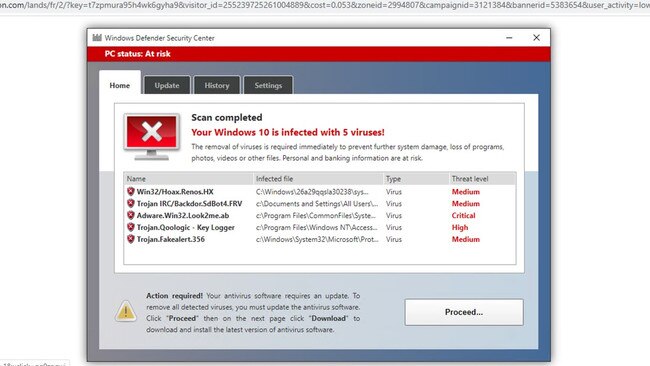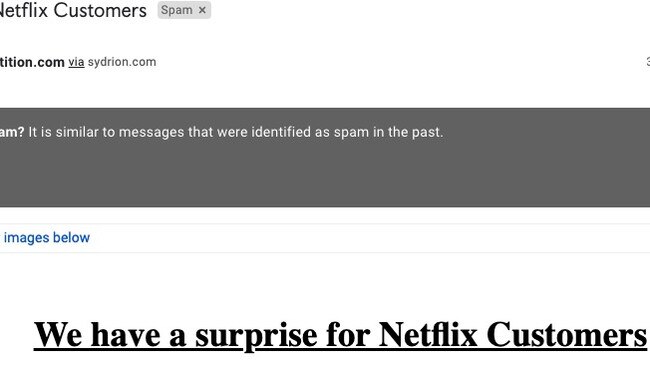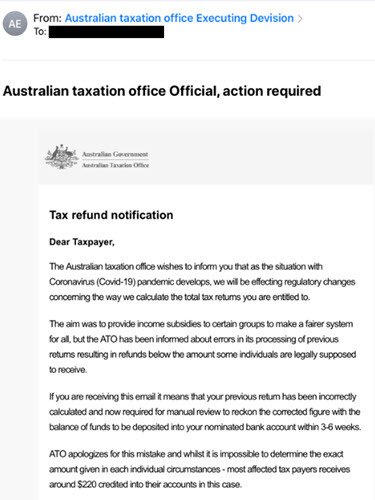Cybersquatting scam targets ATO, Netflix, PayPal, LinkedIn, Google
Unsuspecting Australians are being dudded out of millions of dollars online. Here’s what you need to watch out for.

Security
Don't miss out on the headlines from Security. Followed categories will be added to My News.
- Facebook move that will allow sex predators to groom children
- Facebook loses bid to dodge Aussie legal action
Scammers are using websites that mimic big brand names like Netflix and Apple to pinch sensitive details from unsuspecting victims, letting fraudsters swindle millions of dollars from victims during the coronavirus pandemic.
Cybersecurity company Palo Alto Networks has warned consumers to be wary of cybersquatting scams, which prey on people by posing as a legitimate website.
It can even look similar to big brand names such as PayPal, Apple, Netflix and LinkedIn.
The scam might might land in your inbox, or you might even stumble across a dodgy web page if you mistype a URL while using your internet browser.
Palo Alto Networks says it is detecting 200-700 new cybersquatting domains every day. A domain name is what a user searches for in their internet browser, while a website is what they see when they navigate to the domain name.
Palo Alto Networks observed several squatting cases that have adapted to take advantage of the pandemic. These cases mimicked major brands such as Google, Facebook and YouTube, and combine their trademarks with keywords like “COVID-19” and “coronavirus” to generate squatting domains.
![A cybersquatting domain mimicking Samsung (samsungpr0mo[.]online) looks like a legitimate Australian educational news website, with warnings in the top right-hand corner. Picture: Supplied/Palo Alto Networks](https://content.api.news/v3/images/bin/ade6809369f4c7fa5622b553152809db?width=650)

The fake websites encourage people often encourage users to hand over their credentials, such as login details or banking information. They may also prompt you to download malicious software through, among others, pop-ups that claim your computer is infected with viruses.
“Think about how many times you went to type something as simple as “google.com” but you accidentally missed a letter or two,” Vice President and Regional Chief Security Officer for Asia Pacific at Palo Alto Networks, Sean Duca said.
“Someone has actually created that website knowing we typically will fall accidentally fall victim to mistyping.
“The site looks and smells like it could be the legitimate site, but it’s not.”
Mr Duca said there could be a major financial risk if someone were to hand over their login details to a cybersquatting page posing as a bank.
“I could enter my customer ID and my password, but then, if I was a cyber criminal, I could then have a page that loads that says ‘thank you for entering your details, but the site is under maintenance’,” he said.
“The problem then is, the consumer has given their information to an unknown third party who can then potentially access their banking portal.”
Cybersquatting scams have a number of key goals, including, among others:
- Phishing: Where a web page appears to be legitimate site and encourages a user to hand over their login details (such as their banking details).
- Malware distribution: A cybersquatting domain may look for security weaknesses in a computer system, and if it executes, can then send sensitive details to the bad actor behind it.
- Potentially Unwanted Program: A cybersquatting website could try and get a user to install malicious software, or an internet browser extension. Websites hosting Potentially Unwanted Programs usually try to scare users by showing them warning messages like “Your computer is infected!” or “Your license has expired!” to convince them to download the advertised software.
- Re-bill scam: These offer a subscription to products such as weight loss pills in exchange for a small initial payment. However, users might be charged between $50-100 if they don’t cancel the subscription after the promotion period.
Mr Duca advised Australians to take precautions when online, including:
*Always type the URL — and make sure it’s accurate
*Don’t click on links inside suspicious emails
*Update operating systems with regular patches
*Use security software — and keep it updated
![A fake Netflix main page hosted on netflixbrazilcovid[.]com. Picture: Supplied/Palo Alto Networks](https://content.api.news/v3/images/bin/78602faca9a796024c3ac17e788e07c9?width=650)

It comes as Australians have lost millions of dollars to coronavirus scams, with criminals preying on those looking to protect themselves from the deadly virus.
Scamwatch data from August showed that Australians lost $3.089 million COVID-19-related scams, with almost $613,000 lost to buying or selling hoaxes.
The Australian Competition and Consumer Commission-run website says that bad actors have created fake online stores claiming to sell products that don’t exist, such as cures or vaccinations for COVID-19, and products including face masks.
“[There are] reports of alleged online shopping scam websites purporting to sell expensive medical face masks but not providing the goods,” an ACCC spokesperson told News Corp.
And it isn’t the only way scammers are pinching big bucks from people.
Here is what else Australians need to watch out for:
SUPERANNUATION/PERSONAL INFORMATION SCAMS
Cash-strapped Australians have been racing to access their superannuation early, and scammers have been taking advantage of the situation.
Scamwatch had received almost 1500 reports of attempts to gain personal information, totalling almost $250,000 in losses.
The scam will often start with an unexpected call claiming to be from superannuation or financial service, according to Scamwatch.
It says the fraudsters will often try to obtain information through, among other excuses:
- Offering to help you access the money in your superannuation
- Ensuring you’re not locked out of your account under new rules.
- Checking whether your superannuation account is eligible for various benefits or deals.
There may also phish for sensitive information through fake emails or text messages that appear to be from the government or well-known businesses.
Scamwatch recommends not clicking on hyperlinks in texts, social media messages, or emails even if they come from trusted sources.
Australians should also never respond to unsolicited messages and calls that ask for personal or financial details.
More advice can be found here.


BUYING OR SELLING SCAMS
Consumers have fallen for fake COVID-19 vaccines, treatments, and medical-grade face masks — and it’s costed them dearly.
Nearly 1000 people had lost $612,250 to buying or selling scams, with Scamwatch warning Australians should watch out for “unusual payment methods”.
“[There were] reports of a [now-removed] website that purported to sell a coronavirus vaccine claiming to be from an Australian medical university. The site only accepted payment in Bitcoin,” an ACCC spokesperson said.
They said there were also reports “of alleged online shopping scam websites purporting to sell expensive medical face masks but not providing the goods”.
“Be careful of online shopping sites requesting unusual payment methods such as up-front payment via money order, wire transfer, international funds transfer, pre-loaded card or electronic currency, like Bitcoin,” they said.
“The best way to detect a fake trader or social media online shopping scam is to search for reviews before purchasing.”
You can find out more here.


DATING AND ROMANCE SCAMS
If you’ve been chatting to someone online and they’re asking for money, you shouldn’t hand over the dosh.
Dating and romance scams related to COVID-19 have cost Australians more than $275,000 based on almost 50 reports to Scamwatch.
“The specifics of dating and romance scams vary from report to report, but during COVID have invariably involved a request for money without the reporter having met the scammer,” a Scamwatch spokesperson said.
“The scammer claimed she would come to Australia from Ukraine to work as a doctor in the reporter’s city for the duration of COVID. The scammer sent the reporter copies of a work visa, passport receipts from travel agencies, and claimed they would split finances for the trip. The reporter realised it was a scam and did not send them money.”
These types of scams generally take place through online dating websites, but can crop up on social media or email, Scamwatch says.
The Scammer may ask you for money, gifts, or banking details, and might ask you to send pictures.
You can find out more here.
